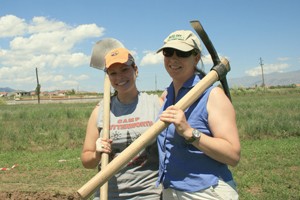
Field Experiences Give Anthropology Student Important 'Suite of Skills'
As her grandmother would say, Kathleen Forste has spent her years at the University of Cincinnati playing in the dirt and digging square holes.
A student in the
in the McMicken College of Arts and Sciences, Forste thinks there is truth to her grandmothers sentiment, but believes archaeology is more than childs play. To her, digging in the dirt is like digging into the lives of ancient peoples.
My interest in archaeology is an offshoot of my interest in history. Ive always been fascinated with Egyptology and the splendor of finding things from thousands of years ago that we havent seen since, Forste explains. I like discovering things and putting pieces of the puzzle together.
Since she arrived at UC from St. Ursula Academy in Cincinnati, she has worked nonstop on those puzzle pieces, studying for her bachelors in anthropology and a certificate in
geographic information systems
from the Department of Geography. In her four years, Forste has completed her coursework (she graduated this quarter), and gallivanted around the globe in the name of research.
Not only did she participate in a field study with Anthropology Professor Ken Tankersley at
in Cincinnati, she completed two field opportunities with Professor Alan Sullivan in Arizona and one in Albania with Professor Susan Allen.
Field experience is a required component of archaeology, Forste says. Its a growing experience because you get out of the classroom and you get involved with pertinent, ongoing research. Theres a lot to be said for that because it opens all sorts of doors for you.
In 2009 and 2010, Forste worked with Professor Sullivan on his
Upper Basin Archaeological Research Project
in the area just south of the Grand Canyon.

Forste has completed field experiences in Ohio, Arizona and Europe.
In Kathleens case, after excelling in our required introductory courses, she identified and took advantage of every field-based research opportunity for undergraduates we offer, says Sullivan. For instance, with a
Taft Undergraduate Enrichment Award
, Kathleen was able to participate in two seasons of my archaeological research project in Arizona, becoming an expert in applications of GPS technology and its integration with other advanced geospatial utilities, such as GIS.
Between her Arizona expeditions, Forste found the time to travel to Albania with Professor Allen for her
Southern Albania Neolithic Archaeological Project
.
In this work, Kathleen is helping with the analysis of macrobotanical remains that we recovered from the early Neolithic site of Vashtëmi, Albania in 2011, says Professor Allen. In addition, she is working with me on the analysis of materials from a diversity of combustion features from a second site dating to the Late Bronze Age (ca. 1500 BC).
Forste adds, Albania is in the corridor of migration from the Middle East to Europe, so the idea is that the site were excavating right now is one of the early areas in southern Europe where there were domesticated crops.
The Albanian archaeobotany research differs greatly from the GIS work in Arizona, but Forste was able to use her previous field experiences for data collection in the new region. "It was good to hone my skills. I got a lot better at orienting myself, taking more concise field notes, and describing the archaeological phenomena."
While still sifting through data, the Albanian research team is already in the beginning phases of drafting a paper to present at the Society of Ethnobiology in May that will be co-authored by Forstea major feat for an undergraduate. She is also collaborating with graduate students on a paper about research findings in Arizona.
Publishing is both exciting and terrifying, Forste says with a laugh. Its something new for me, and Im really glad they offered me the opportunities to work with them.
Since earning her BA winter quarter, Forste is continuing her education at UC in
, allowing her to get her MA with just one more year on campus.
But leave it to Forste to pack as much into that year as possible. She is already planning another trip back to Albania with Allen this August.
Ive taken away many things from anthropology, but the archaeological field research has given me a very important suite of skills, Forste says. Its exposed me to different types of archaeology and the differences that can be found in the archaeological record across the world.
Related Stories
UC’s spring Visiting Writers Series promises robust, diverse...
December 20, 2024
Lovers of literature, poetry and the written word can look forward to a rich series of visiting writer presentations, offered through UC’s College of Arts and Sciences department of English, coming this spring.
Should voters have more say in Ohio's Legislature?
December 19, 2024
UC Professor David Niven talks to WVXU about gerrymandering in Ohio.
How tadpoles make the leap to frogs
December 18, 2024
In his biology lab, UC Professor Daniel Buchholz and his students are using a National Science Foundation grant to study the hormones that trigger metamorphosis in frogs.
